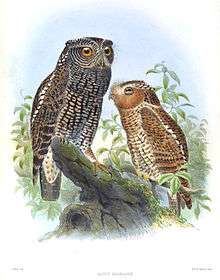Bearded screech owl
| Bearded screech owl | |
|---|---|
 | |
| Scientific classification | |
| Kingdom: | Animalia |
| Phylum: | Chordata |
| Class: | Aves |
| Order: | Strigiformes |
| Family: | Strigidae |
| Genus: | Megascops |
| Species: | M. barbarus |
| Binomial name | |
| Megascops barbarus (P.L.Sclater & Salvin, 1868) | |
| Synonyms | |
|
Otus barbarus (P.L.Sclater & Salvin, 1868) | |
The bearded screech owl (Megascops barbarus) is a species of small owl in the family Strigidae. It is found in highlands of central and western Guatemala and central Chiapas, Mexico. Its natural habitat is subtropical or tropical moist montane forests. It is threatened by habitat loss.
Taxonomy
First described by Philip Sclater and Osbert Salvin in 1868, the bearded screech owl is one of more than 20 small owls in the genus Megascops.
Description
Adults have a length of 16 to 20 cm (6.3 to 7.9 in) and weigh 58–79 g (2.0–2.8 oz); their wingspan is undocumented.[2] Females are, on average, heavier than males.[2] The ear tufts are very small. There is a light brown and reddish-brown morph. The face veil is light with a thin dark border. The top has brown, white and black spots, the spots on the upper mantle are a strong white. The shoulder feathers have black-fringed whitish outer flags. The chest has a thick brown and yellow-brown banding. Flanks and belly are white and show dark shaft streaks. The barrel is feathered. The wings extend beyond the short tail. The iris is yellow. The beak is greenish-gray. The toes are pink-gray. Representatives of the reddish-brown patterned morphs are less strong and the markings on the top and bottom are reddish brown. Their call is a short fast trills 3:00 to 5:00 seconds duration, its volume increases at the beginning and end abruptly drops.
Habitat and range
The bearded screech owl is found from the highlands of central Chiapas, Mexico to the highlands of central and western Guatemala. It occurs in humid montane forest, typically at elevations above 1,800 m (5,900 ft),[2] though it has been recorded as low as 1,350 m (4,430 ft).[3] It is thought to be resident, with no migratory movements.[2]
References
- ↑ BirdLife International (2013). "Megascops barbarus". IUCN Red List of Threatened Species. Version 2013.2. International Union for Conservation of Nature. Retrieved 26 November 2013.
- 1 2 3 4 Weidensaul, Scott (2015). Peterson Reference Guide to Owls of North America and the Caribbean. New York, NY, US: Houghton Mifflin Harcourt. pp. 87–90. ISBN 978-0-547-84003-1. Retrieved 2 May 2016.
- ↑ König, Claus; Weick, Friedhelm. Owls of the World. London, UK: Christopher Helm. p. 102. ISBN 978-0-7136-6548-2. Retrieved 2 May 2016.
